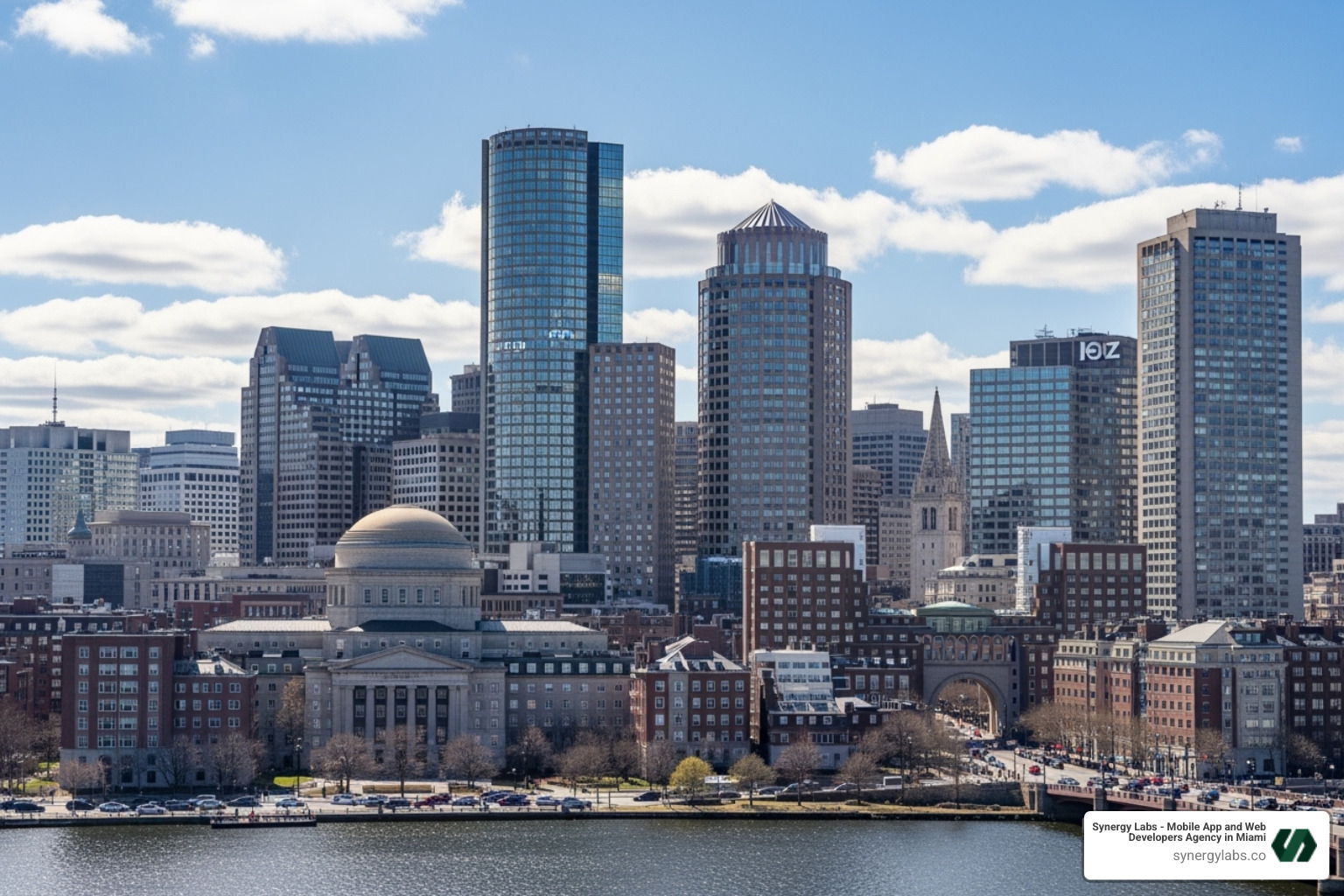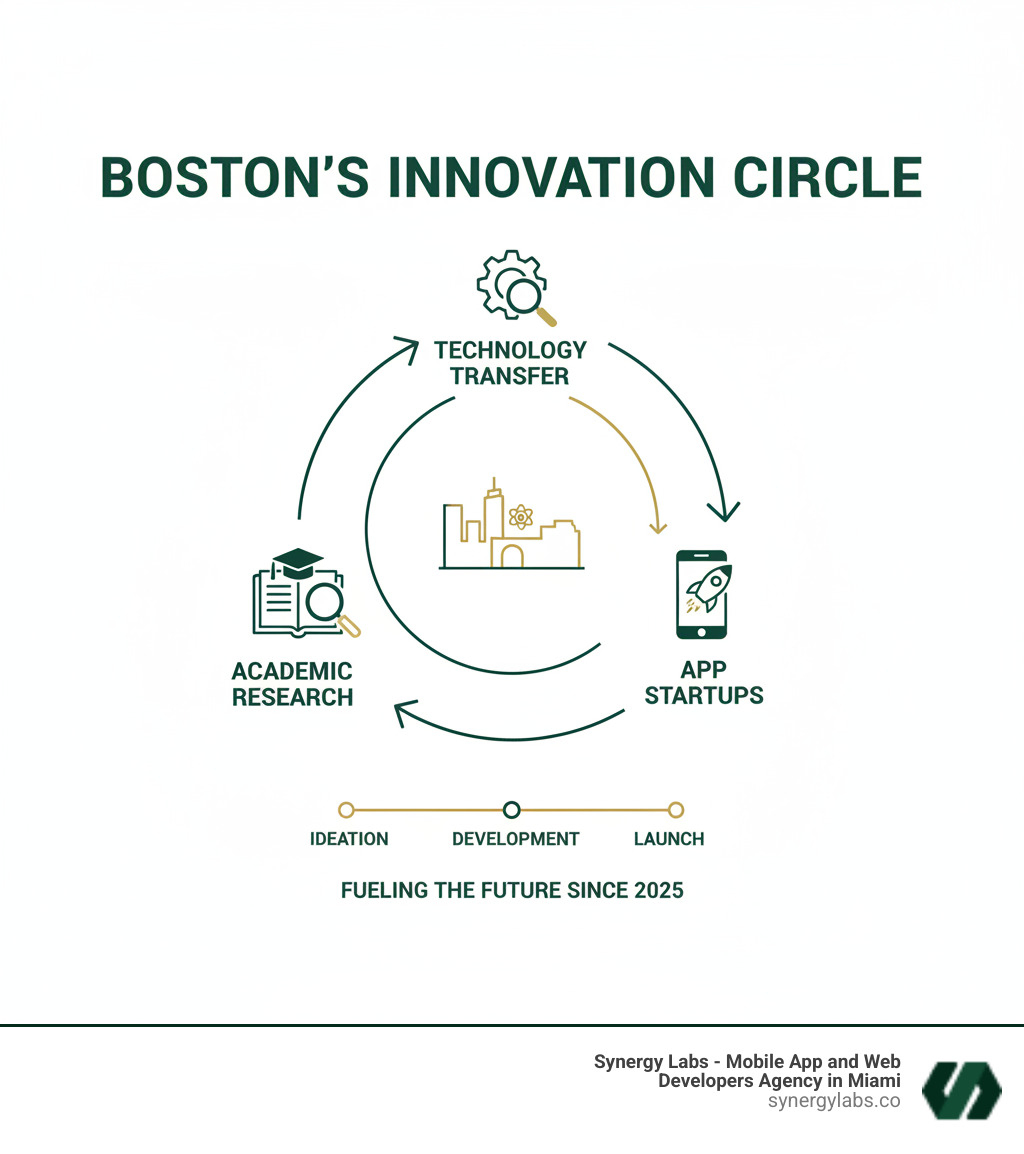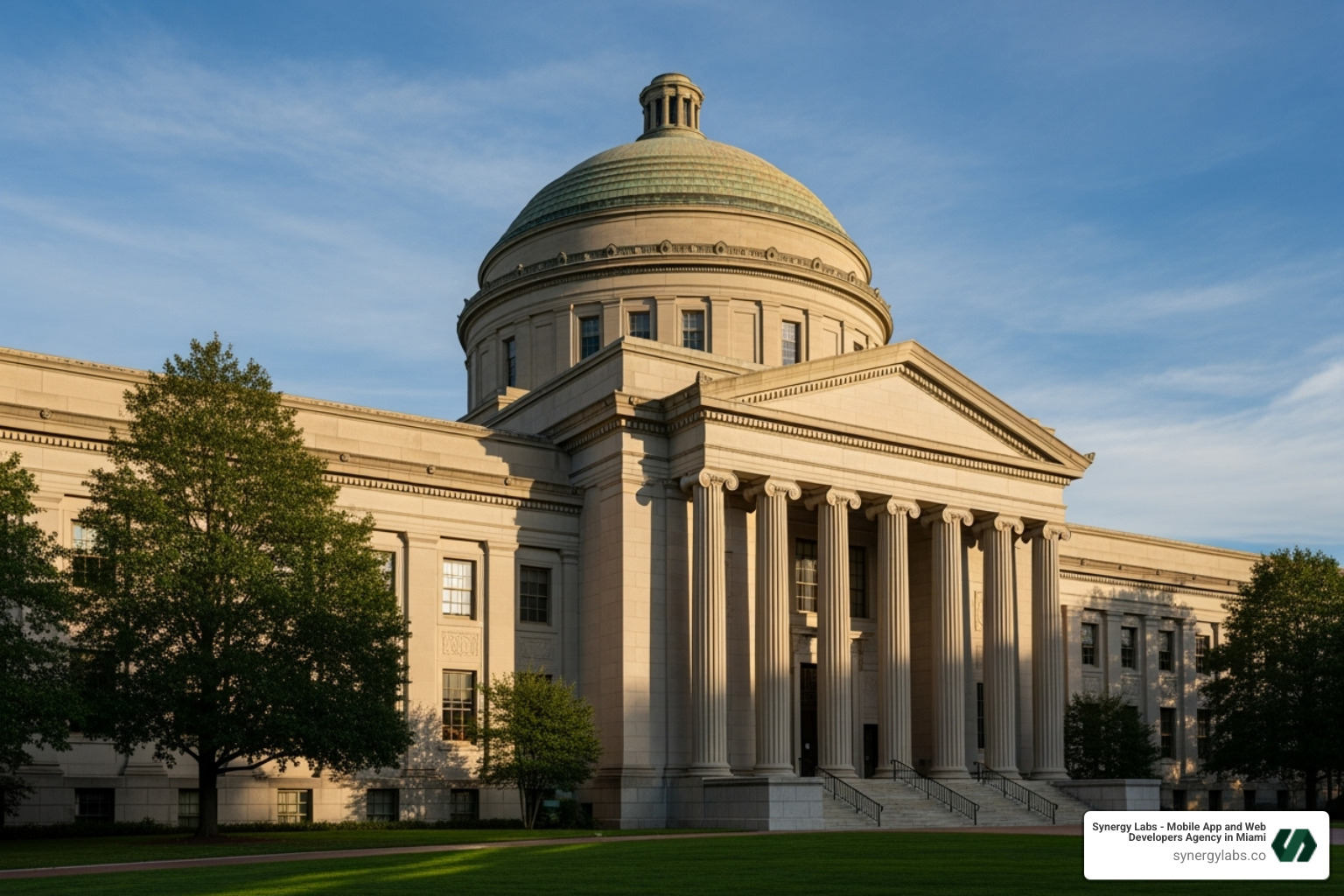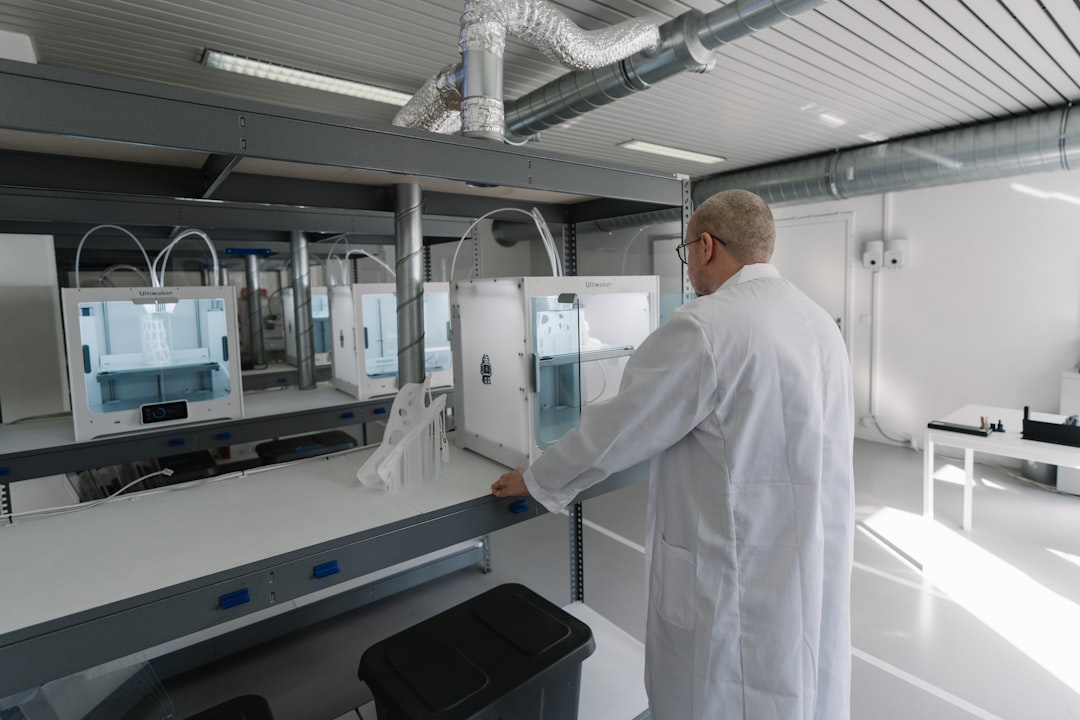Partner with a TOP-TIER Agency
Schedule a meeting via the form here and
we’ll connect you directly with our director of product—no salespeople involved.
Prefer to talk now?
Give us a call at + 1 (645) 444 - 1069
"Represents one of America's most powerful and self-sustaining innovation ecosystems. Here's how it works:"

Boston's Innovation Circle: From Academic Research to App Startups represents one of America's most powerful and self-sustaining innovation ecosystems. Here's how it works:
The Core Components:
When Percy Spencer walked through a radar test room at a Boston-area technology company in 1946, the melted chocolate bar in his pocket sparked the invention of the microwave oven. This story captures Boston's essence - breakthrough innovations emerging from the intersection of research, curiosity, and practical application.
Boston has been reshaping technology for centuries. From building the Mark I computer in 1944 to founding one of the world's first venture capital firms in 1946, the city established itself as America's innovation capital long before Silicon Valley existed. Today, this legacy continues through a thriving ecosystem where academic research seamlessly transforms into cutting-edge mobile apps and tech startups.
The numbers tell the story. Massachusetts companies raised $4.2 billion in venture capital funding, while the region's life sciences sector alone holds over $100 billion in market capitalization. With employment in high-tech industries growing 9% annually since 2010, Boston proves that deep research and commercial success go hand in hand.
What makes Boston unique isn't just its concentration of world-class universities - it's the "bump and connect" culture that turns lab findies into market-ready applications. This collaborative spirit, combined with strategic government initiatives like the $1 billion life sciences investment, creates an innovation circle where today's research becomes tomorrow's breakthrough app.
As an experienced mobile app developer who has worked with tech startups across diverse industries, I've seen how Boston's Innovation Circle: From Academic Research to App Startups creates unparalleled opportunities for founders looking to transform complex research into user-friendly applications. Having helped companies steer the critical transition from concept to scalable mobile solutions, I understand the unique challenges and opportunities within this ecosystem.

When we trace the origins of modern technology, Boston’s fingerprints are everywhere. Long before "Silicon Valley" became a household name, the labs and minds of Boston were quietly laying the groundwork for the digital revolution.

Our journey through Boston's innovation circle truly begins in the mid-20th century. In 1944, Harvard built the Harvard built the Mark I — one of the very first automatic digital computers. This wasn't just a fancy calculator; it was a monumental step towards the programmable machines that would eventually power our app-filled world. Around the same time, MIT was deeply interested in projects like the Whirlwind computer and the SAGE air defense system. These ambitious undertakings didn't just push the boundaries of computing; they also established a culture of interdisciplinary research and large-scale engineering that remains a hallmark of Boston's innovation today.
By the late 1950s and early '60s, the region around Boston earned a new moniker: "Route 128— America's First High-Tech Region." Defense contractors and dozens of burgeoning computer startups flocked to this corridor, drawn by their proximity to MIT, Harvard, and a burgeoning ecosystem of ideas. Pioneering computer companies emerged from this fertile ground, with one eventually becoming the world's second-largest computer maker by the mid-1980s. This period, often dubbed the "Massachusetts Miracle," saw Boston lead the minicomputer era, shaping how businesses and institutions processed information long before personal computers became ubiquitous.
But Boston's contribution wasn't limited to hardware. The PC revolution of the 1970s and 80s also saw significant Bostonian breakthroughs. The first true "killer app," a revolutionary spreadsheet software that helped establish early personal computers as serious business tools, was developed by Dan Bricklin and Bob Frankston in 1978. Soon after, another Boston-born spreadsheet software generated over $50 million in its first year, cementing the city's role in the software industry.
Equally critical to this historical foundation was the birth of modern venture capital. In 1946, a Harvard professor founded what is widely recognized as one of the first venture capital firms in the world. This revolutionary vision was to provide financial backing to innovative companies that were too risky for traditional banks. This model of risk capital, born in Boston, became the blueprint for funding the startups that would drive technological progress for decades to come, including early investments in pioneering computer companies.
As the world shifted, so did Boston. The internet and dot-com era of the 1990s saw a new wave of innovation. Boston was home to early web pioneers, including one of the first major search engine portals and a company that pioneered online job recruiting. In 1998, an MIT mathematician and a graduate student founded a company that became essential for handling the massive traffic volumes of the fast-growing internet. Furthermore, the RSA encryption algorithm, invented by MIT researchers in 1977, formed the foundation for a company that became a cornerstone of internet security.
The dot-com crash hit many tech hubs hard, but Boston's diversified economy, particularly its burgeoning biotech sector, allowed it to maintain its position as a top three tech hub. This resilience set the stage for the startup renaissance and the mobile era of the 2000s and 2010s.
The emergence of accelerators and incubators played a pivotal role in this new chapter. In 2005, a groundbreaking seed accelerator chose Cambridge, Massachusetts, as one of its initial homes. Another major accelerator launched its first program outside of its home city in Boston in 2009, and one of the largest zero-equity startup accelerators globally followed in 2010. These programs provided crucial mentorship, resources, and funding access to a new generation of entrepreneurs.
Boston also became a leader in new software paradigms. A company founded by MIT alumni in 2006 became a leader in inbound marketing software and went public in 2014, demonstrating Boston's prowess in enterprise software. The mobile era brought early fitness and analytics apps, and robotics innovation gained significant traction, with a major tech company deepening its local presence after acquiring a North Reading-based robotics firm in 2012. Other major tech companies also established significant research and development centers in Cambridge, further solidifying the region's tech landscape.
What truly distinguishes Boston's innovation ecosystem is its intricate web of interconnected components, working in synergy to foster continuous groundbreaking advancements. It’s a carefully balanced equation where each element amplifies the others, creating a self-sustaining cycle of findy and commercialization.

At its heart, we find what we call the "five key drivers of innovation": strong entrepreneurship, robust local networking, ample local funding, significant local demand, and a keen eye on global demand. This framework, championed by historians of Boston's innovation, explains why the city has remained an engine of progress for centuries.
Central to this dynamic is the "bump and connect" culture—the planned and unplanned meetings, conversations, and collaborations among individuals that spark new ideas, provide missing pieces of the puzzle, and offer critical feedback. This isn't just about formal meetings; it’s about the serendipitous encounters in coffee shops, shared lab spaces, or networking events that often lead to the next big breakthrough. We've seen this culture foster an environment where collaboration is not just encouraged but is a core principle.
The academic prowess underpinning this ecosystem is staggering. Over the past twenty-five years, researchers in the Greater Boston area authored more scientific papers in the top three science journals than scientists from any other city worldwide. And if you needed more proof of intellectual horsepower, consider this: more than 170 Nobel Prize winners have conducted their significant work in Massachusetts, or they have worked in the state for significant portions of their professional career. If Massachusetts were an independent nation, it would rank second globally for Nobel Prizes. That’s a pretty impressive track record!
Our academic institutions are undeniably the primary engine of Boston's innovation. With 66 universities within the metropolitan area, including global titans like MIT and Harvard, Boston annually attracts 250,000 students. This creates an unparalleled, constant pipeline of fresh talent, cutting-edge ideas, and future entrepreneurs.
MIT, with its relentless focus on engineering, science, and technology, has been a global force in computer science and app development for decades, producing influential innovations like Lisp, Multics, and RSA encryption. Harvard, while renowned for its liberal arts and business, has also played a pivotal role, not only pioneering the modern venture capital model but also fostering a vibrant ecosystem through institutions like the Wyss Institute, the MIT Media Lab, and the Harvard Innovation Lab (i-Lab). These institutions are not just ivory towers; they are hubs of translational research, actively seeking to bridge the gap between academic findy and real-world application.
University-industry partnerships are a cornerstone of this system. We often see research breakthroughs transition quickly from labs to the market because universities are working hand-in-hand with companies. This is where specialized services, like those we offer at Synergy Labs, become invaluable. We help bridge the gap between complex research and market-ready products. To learn more about how we facilitate this, visit our services.
The sheer volume and quality of Boston's talent pool are best. We're talking about a highly educated workforce, with an impressive 39.2 percent of adults aged 18 to 34 holding a bachelor’s degree. This demographic is further bolstered by the presence of many of the top STEM schools in the country, ensuring a steady supply of skilled professionals ready to tackle the challenges of the tech world.
This robust talent pool directly feeds an impressive tech sector workforce, which a 2015 technology office outlook report found to be second only to Silicon Valley. Employment in high-tech industries in Boston has grown 9 percent each year since 2010, underscoring the dynamic nature of this sector.
Beyond sheer numbers, Boston's talent pool is increasingly diverse. Between 2009 and 2013, Massachusetts saw a 21.4 percent growth rate of women in tech. This positive trend is reflected in the entrepreneurial landscape, where 29 percent of startup founders in the city are female—a figure that was second only to Chicago at the time of reporting. This is significantly higher than the national average and speaks to a more inclusive environment. We see this with successful women-led startups in fields like family care and lifestyle experiences, which exemplify the vibrant and diverse entrepreneurial spirit thriving in Boston.
The true magic of Boston's innovation ecosystem lies in its ability to transform raw academic research into tangible, market-ready products, including cutting-edge app startups. This isn't an accidental phenomenon; it's the result of a deliberate and strategic evolution, carefully cultivated over decades.

Our journey from an academic hub to an innovation powerhouse was significantly boosted by robust government support. A prime example is the visionary ten-year, one-billion-dollar initiative launched in 2008 by then-Governor Deval Patrick and the Massachusetts legislature. The goal was ambitious: to transform Massachusetts from a leading life sciences academic research hub to a world-leading life sciences innovation hub. This initiative, spearheaded by the Massachusetts Life Sciences Center (MSLC), was a game-changer, focusing heavily on translational research—the process of turning scientific findies into practical applications. It funded everything from grants for academic institutions to hire Entrepreneurs-In-Residence to the creation of incubating spaces on university campuses, all designed to foster company formation and academic-industry partnerships.
Boston's innovation circle excels in specific sectors, driven by its academic strengths and strategic investments. Life sciences and biotech stand out prominently. The Massachusetts biomanufacturing workforce, for instance, is growing at an impressive rate of 6.3%, outpacing many other regions. The city’s life sciences sector, including the medical device industry, holds a market capitalization exceeding $100 billion, and Massachusetts is the top employer for biopharma in the country and around the world. Kendall Square in Cambridge, often dubbed "the most innovative square mile on the planet," embodies this success, having grown from just two biotech companies in 1990 to over a hundred today, employing more than seventy thousand people statewide.
Beyond biotech, Boston is also a leader in robotics and AI, with companies in robotics and AI-powered weather platforms showcasing the city's expanding influence. Data science, automation, fintech, and enterprise software are other sectors where Boston consistently demonstrates leadership.
The direct path from lab to market is a defining characteristic here. Research on innovation hubs highlights the power of proximity, access to specialized talent, and government support as key drivers. These elements collectively create environments where complex research is not just published but actively commercialized.
In the modern era, Boston's innovation circle has perfected the art of commercializing research, particularly in the field of app startups. University Technology Transfer offices play a critical role, acting as conduits that help researchers patent their findies and license them to new companies.
We see compelling case studies of successful technology transfer regularly. For example, startup news from Harvard highlights ventures, such as one that licensed bioproduction technology from the Wyss Institute to decarbonize industries. Another company, emerging from Harvard research, secured $10.5 million in seed funding for a naturally-derived solution to degrade plastics. These aren't just academic curiosities; they are foundational technologies that, with the right development, could easily translate into powerful data analysis apps, supply chain optimization apps, or even consumer-facing sustainability apps.
The role of national innovation programs, such as the National Science Foundation's Innovation Corps (NSF I-Corps), is also vital. The NSF I-Corps mission is to improve the commercialization of research-based technology in the New England area. It provides hands-on training, mentorship, and funding for customer findy, helping researchers and students explore the commercial potential of their ideas. A powerful example is a team that launched a company offering a non-invasive test for bladder cancer after participating in I-Corps and winning university competitions. This kind of deep scientific research, once validated and commercialized, can then be integrated into mobile health apps for diagnostics, patient monitoring, or data visualization, bringing the lab directly to the user's pocket.
The journey from a scientific finding to a mobile application is complex. It requires not only scientific rigor but also user-centered design, robust security, and cross-platform development expertise. This is where companies like ours, Synergy Labs, excel. We specialize in changing these groundbreaking research concepts into high-quality, scalable mobile apps. Imagine a diagnostic tool developed in an MIT lab being made accessible to millions through an intuitive health tech app—that's the kind of transition Boston's innovation circle facilitates, and that we help bring to life.
The strength of Boston's innovation circle isn't just in its ideas or its talent; it's in the robust, interconnected support network that fuels startup growth. This thriving ecosystem is a complex web of organizations, institutions, and individuals all working together to nurture new ventures from nascent ideas to market leaders.
Boston's entrepreneurial spirit is palpable, supported by an impressive 56 accelerators and incubators. These organizations provide critical early-stage support, mentorship, and resources. Complementing this is a formidable financial backbone: Boston boasts 65 venture capital firms, committed to driving innovation with significant capital. Public agencies also play their part, with 13 government bodies actively fostering the innovation environment. Beyond these, a wealth of professional services—legal, financial, and public relations—abound, ensuring that startups have access to the expert guidance they need at every stage of their journey.
Accelerators and incubators are the fertile ground where many of Boston's app startups take root and begin to flourish. They provide essential guidance and resources for first-time founders, helping them steer the often-treacherous early stages of company building.
We've seen how accelerator programs launched in 2009 and 2010 have become pivotal. These organizations offer structured programs that include mentorship from seasoned entrepreneurs, access to investor networks, office space, and often, seed funding. Local innovation centers, for example, support over 1,000 companies by providing infrastructure and co-working space, acting as a crucial physical hub for many startups.
University competitions also play a significant role. The MIT $100K Entrepreneurship Competition, which started as a $10K prize in 1989, has helped launch over 160 companies and created more than 4,600 jobs by 2012. These competitions not only provide prize money but also invaluable experience, mentorship, and validation for nascent ideas, often directly leading to the formation of app startups.
Access to capital is the lifeblood of any startup ecosystem, and Boston is exceptionally well-resourced in this regard. The city has consistently topped the charts alongside California for the most venture capital per capita invested in the U.S. In 2014 alone, Massachusetts companies raised $4.2 billion in venture capital funding, a 37 percent increase. This financial prowess underscores the confidence investors have in Boston's innovative potential.
The funding landscape is diverse, ranging from institutionalized "super-angels and angel groups" that provide crucial seed-stage funds to a growing number of industry-focused funds. These specialized funds bring not only capital but also significant expertise and capital to specific sectors, further bolstering the growth of targeted app startups—from biotech-centric apps to fintech platforms. This culture of investing in bold ideas, often born from deep academic research, ensures that promising ventures don't wither for lack of financial support.
When we compare Boston's innovation circle to other major tech hubs, its unique characteristics become strikingly clear. While places like Silicon Valley might be synonymous with consumer social media or rapid-fire tech trends, Boston carves its niche in what we call "deep tech" and research-driven innovation. It's a place where groundbreaking scientific findies are not just celebrated but systematically translated into commercial ventures.
This interdisciplinary approach, blending software with science, is a hallmark of Boston. We see it in the seamless integration of AI into biotech research, the development of complex cybersecurity solutions, and the creation of advanced health tech platforms. This isn't just about building apps; it's about solving fundamental, often complex, problems with robust, scientifically backed solutions. Local networking events are crucial in strengthening this ecosystem, providing platforms for networking, knowledge sharing, and mapping the intricate connections within the innovation circle.
Boston's distinctiveness stems from several factors. We observe a lesser focus on fleeting consumer trends and a greater emphasis on tackling complex problems that require extensive R&D. This is evident in its strengths across AI, cybersecurity, health technology, and financial technology. For example, AI-powered weather platforms represent Boston's expanding influence in AI, while innovations in the medical device industry contribute significantly to its economic growth.
Furthermore, many describe Boston's tech culture as more collaborative and less cutthroat than some other hubs. The "bump and connect" ethos fosters a spirit of mutual support, where sharing ideas and expertise is commonplace. This is a nurturing environment for startups, especially those attempting to commercialize complex academic research.
To truly celebrate and make accessible this rich history, there's even a concept for an "Innovation Trail" similar to the Freedom Trail. This initiative aims to highlight Boston's continuous legacy of innovation, from early inventions to modern advancements, and to surface the stories of underrepresented figures in innovation history.
No ecosystem is without its challenges, and Boston's innovation circle is actively addressing several key areas. One significant challenge is the high cost of living, which can impact talent retention despite the city's robust talent pipeline. Attracting and retaining top talent remains a constant focus. Potential funding gaps, particularly for certain stages or types of ventures, also require ongoing attention. These are precisely the kinds of topics discussed at local industry events, where stakeholders convene to identify and strategize solutions.
Looking ahead, the future trends and opportunities for Boston's innovation ecosystem are incredibly bright. Continued growth in biotech and AI is a given, with constant breakthroughs emerging from university labs and translating into new companies and applications. Fostering diversity and inclusion is also a critical area of focus. Efforts are being made to surface stories of underrepresented innovators, such as the pioneering programmer Admiral Grace Hopper and inventor Lewis Latimer, ensuring that the full spectrum of contributions to Boston's innovative past is recognized and celebrated, inspiring a new generation of diverse founders.
The city's strong academic foundation, coupled with its collaborative spirit and strategic investments, positions it perfectly to lead in emerging fields. We anticipate even greater synergy between academic research and app startups, particularly in areas like personalized medicine, sustainable technologies, and advanced AI applications, further solidifying Boston’s Innovation Circle: From Academic Research to App Startups as a global benchmark.
We've journeyed through Boston's remarkable history, explored its vibrant present, and glimpsed its promising future. What emerges is a powerful picture of Boston’s Innovation Circle: From Academic Research to App Startups – a dynamic, self-sustaining ecosystem built on the pillars of world-class academia, a deep and diverse talent pool, robust funding mechanisms, and a deeply ingrained culture of collaboration.
Boston's legacy is one of continuous innovation, where groundbreaking research consistently translates into world-changing companies and, increasingly, into innovative mobile applications. From the Mark I computer to the latest biotech breakthroughs, the city has demonstrated an unparalleled ability to nurture ideas from concept to commercial success.
For startups born from this incredible ecosystem, translating complex research into a user-friendly, scalable mobile app is often the final, critical step. This is where specialized expertise becomes indispensable. At Synergy Labs, we understand the nuances of taking sophisticated academic findies and changing them into accessible, secure, and intuitive cross-platform mobile apps. Our unique approach offers direct access to senior talent, ensuring that your innovation is handled with the care and precision it deserves, from user-centered design to robust security implementation. We pride ourselves on rapid app launches and ongoing support, ensuring your innovation reaches its full market potential.
If you're a founder within Boston's innovation circle, ready to bridge the gap between your groundbreaking research and a market-ready app, we're here to help you make that leap. Partnering with an expert development team like Synergy Labs can bridge that gap, ensuring your innovation reaches its full market potential. Explore our work and find how we can help you turn your vision into a reality.
Getting started is easy! Simply reach out to us by sharing your idea through our contact form. One of our team members will respond within one working day via email or phone to discuss your project in detail. We’re excited to help you turn your vision into reality!
Choosing SynergyLabs means partnering with a top-tier boutique mobile app development agency that prioritizes your needs. Our fully U.S.-based team is dedicated to delivering high-quality, scalable, and cross-platform apps quickly and affordably. We focus on personalized service, ensuring that you work directly with senior talent throughout your project. Our commitment to innovation, client satisfaction, and transparent communication sets us apart from other agencies. With SynergyLabs, you can trust that your vision will be brought to life with expertise and care.
We typically launch apps within 6 to 8 weeks, depending on the complexity and features of your project. Our streamlined development process ensures that you can bring your app to market quickly while still receiving a high-quality product.
Our cross-platform development method allows us to create both web and mobile applications simultaneously. This means your mobile app will be available on both iOS and Android, ensuring a broad reach and a seamless user experience across all devices. Our approach helps you save time and resources while maximizing your app's potential.
At SynergyLabs, we utilize a variety of programming languages and frameworks to best suit your project’s needs. For cross-platform development, we use Flutter or Flutterflow, which allows us to efficiently support web, Android, and iOS with a single codebase—ideal for projects with tight budgets. For native applications, we employ Swift for iOS and Kotlin for Android applications.




For web applications, we combine frontend layout frameworks like Ant Design, or Material Design with React. On the backend, we typically use Laravel or Yii2 for monolithic projects, and Node.js for serverless architectures.






Additionally, we can support various technologies, including Microsoft Azure, Google Cloud, Firebase, Amazon Web Services (AWS), React Native, Docker, NGINX, Apache, and more. This diverse skill set enables us to deliver robust and scalable solutions tailored to your specific requirements.








Security is a top priority for us. We implement industry-standard security measures, including data encryption, secure coding practices, and regular security audits, to protect your app and user data.
Yes, we offer ongoing support, maintenance, and updates for your app. After completing your project, you will receive up to 4 weeks of complimentary maintenance to ensure everything runs smoothly. Following this period, we provide flexible ongoing support options tailored to your needs, so you can focus on growing your business while we handle your app's maintenance and updates.